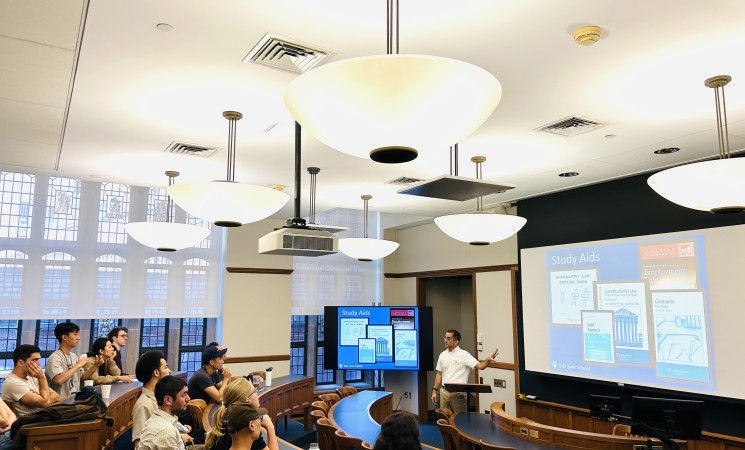Research Instruction for 2024-2025

Welcome (back) to Yale Law School!
As a new semester and year begins, the librarians here at the Lillian Goldman Law Library have new research courses to offer, as well as some beloved staples. Research courses range from 1-3 credits, with some meeting over the whole term and other meeting for only a portion. From generalized courses to subject specific, we're sure you'll find something valuable.
This semester's offerings are:
- History and Language Research in Legal Practice (20045-01)
- Units: 2, Credit or Fail
- Instructor: Steven Mitchell
- Thursdays 4:10 PM-6:30 PM, SLB-111
- In recent decades, American courts have taken an increased interest in incorporating interdisciplinary research into their legal decision-making process. This course introduces students to interdisciplinary research sources and methodologies in legal practice through the lens of two areas which have recently gained legal valence: history and language. Through exercises, research projects, and discussions of readings, students will learn how to critically address the pragmatic and theoretical questions a practicing lawyer should consider in research and apply them to legal research: namely how to practically identify, find, evaluate, apply, and ethically use information in the context of legal advocacy.
- Practical Artificial Intelligence (20041-01)
- Units: 1, Grade Mode: Credit or Fail
- Instructors: Jason Eiseman, Steven Mitchell, and Nor Ortiz
- Wednesdays 3:10 PM-5:00 PM, SLB-122 (first seven weeks of the term)
- This class will explore the transformative power of artificial intelligence in the field of legal research. Students will gain hands-on experience with AI technology, gaining a solid foundation in AI and its practical applications within law: how AI tools can enhance general productivity, innovative scholarship, and revolutionize law practice. Through hands-on workshops, case studies, and discussions with industry experts, students will learn to leverage AI responsibly and effectively, preparing them for a future where AI is an integral part of legal work and equipping them with the knowledge and skills to navigate the AI landscape with confidence and creativity.
- Rare Books and Manuscripts for Legal Historical Research (20042-01)
- Units: 1, Credit or Fail
- Instructor: Kathryn James
- Wednesdays 1:10 PM-3:00 PM, Law Library - Rare Book Room (first seven weeks of the term)
- This course equips J.D., LL.M., and M.S.L. students with the skills and experience to engage with rare book and manuscript collections for legal historical research. The course focuses on medieval and early modern legal practices of textual production, circulation, and reception, to introduce practices and methodologies applicable to the study of textual artifacts for other historical periods. The course will meet in the Law Library’s Rare Book Room and the Beinecke Library, drawing on Yale University’s internationally-recognized law rare book and manuscript collections. Topics include: manuscript and print traditions; approaches to paleography; professional writing and legal documents; histories of law publishing, circulation, and readership; material cultures of law practice; collection development and canon formation.
- Assignments will be hands-on, asking students to engage with rare book and manuscript collections each week. Some examples include: transcribing a passage from an early modern manuscript; locating a citation in early manuscript and printed editions of a text; describing the material and textual components of an historical legal document.
- Research Methods and Sources in Critical Legal Theory (20043-01)
- Units: 1 or 2, Credit or Fail, counts toward experiential unit requirement
- Instructor: Nicholas Mignanelli
- Wednesdays 3:10 PM-5:00 PM, Baker Hall 124 (first seven weeks of the term)
- This research course intended for aspiring movement lawyers and critical legal scholars begins with a deconstruction of the traditional legal research process and an exploration of Critical Legal Research methods and strategies. In the classes that follow, students will be exposed to the respective research methods, practices, and sources of critical legal studies, feminist legal theory, and Critical Race Theory. This course concludes with an examination of the political economy of legal information and critical assessments of emerging law practice technologies. Students who wish to qualify for a second unit will need to write a paper. Late Drop Policy: Students must attend the first class meeting.
For a complete list of courses offered by our librarians this year, please visit our Research Instructions page.
Topics
Research Instruction